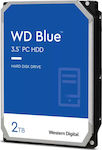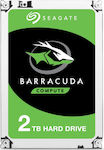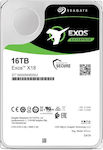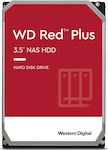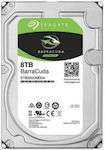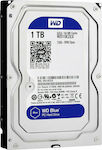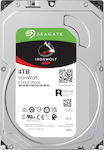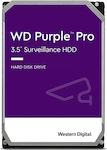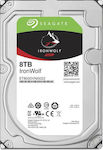I don't know where to start. Looking back, the 8TB seems crazy and why would you need so much storage space, but time flies and now we have cameras that record in 4K, movies that reach 20-30GB, and games that require 200GB just for the intro scene, so here we are. With the speeds that SSDs are playing at nowadays, as we all understand, this one is meant for storage (late storage if you know what I mean, inside joke :P).
A year ago, I bought the 4TB from the same series and I was extremely satisfied with the purchase. Of course, you never know with hard drives, they can die from one day to the next or last you until old age. I had such hard drives and I had others that died within a month! As I said in another review (yes, I'm talking to you, who faithfully follows me because I say things nicely, my friend :P), hardware is like a box of chocolates, you never know what you're going to get! It arrives, you shake it, you beg God for mercy this time, you open the box, plug it in, and voila, DOA.
After breaking out in a cold sweat (yes, I know we've all experienced it, especially with hardware), the damn thing worked. Fun fact, Western Digital, which many consider to be the top, has the highest failure rate among hard drive manufacturers (yes, I know I've said it before and I'll say it again).
Introduction, Features & Performance:
A little history lesson, the BarraCuda series goes back 30 years (yes, you weren't even born yet and yet you question its reliability! :P). The 8TB is larger in size than the 4TB (no, I don't mean in capacity, but physically), not that it matters since nobody cares (except for you, who bought a mid tower and tried to fit the 3090 in it, well, whose fault is that?).
So, technically speaking: It has SATA 3 (6GB/s) with 256MB cache and a rotational speed of 5,400RPM. And here, everyone will start complaining that it's so old and that their first hard drive was faster and blah blah blah, hold on, do you know what Multi-Tier Caching technology is? Well, with this, Seagate helps it perform faster even with its low rotational speed. Specifically, and according to Seagate, it uses a NAND Flash that helps improve the unit's performance by optimizing the flow of data to and from the drive.
As for real-world results, if you're asking if it matches a hard drive with 7200 RPM, no, but it's very close in performance and at a much lower price.
In terms of temperatures, it hasn't raised them more than it should, and I haven't had any issues so far (but we do clean our PCs every now and then to have good airflow, right, kids?).
Lastly, it's not silent, but it's not annoying either for the few seconds when it starts spinning.
Verdict:
If you're in the market for a hard drive for larger storage space, look no further. It's a very reliable choice from a very good company (until it dies on you and you lose all your files, you might say, but been there, done that), and at a very good price compared to the competition.
Pros:
+ Large capacity
+ Fast transfer rates (for a rotational speed of 5,400RPM)
+ Affordable compared to the competition
Cons:
- None





























